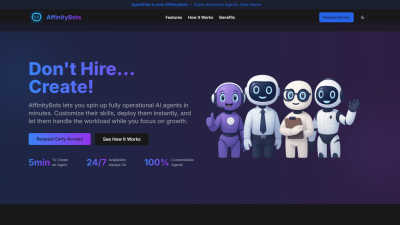Best Knowledge Management AI tools (3+)
Discover 3+ best knowledge management AI tools. Compare features, pricing, and reviews. Free and paid options available.
The Forge Calculator
The Forge Calculator helps Roblox players optimize crafting by predicting outcomes and estimating ore chances effortl...
Vison AI
Transform anonymous web visitors into qualified leads with Kwin, your AI-powered Business Development Representative.
AffinityBots
AffinityBots lets you build and deploy custom AI agents to automate tasks with no coding required.
FAQs for Knowledge Management
How does the Knowledge Management Category enhance collaboration within teams?
The Knowledge Management Category enhances collaboration within teams by providing centralized resources and collaborative tools that promote shared knowledge. These features enable team members to access and contribute information in real-time, ensuring everyone is aligned and fostering a culture of innovation through continuous communication.
What role does integration play in the Knowledge Management Category?
Integration plays a crucial role in the Knowledge Management Category by allowing organizations to connect various data sources and tools into a cohesive system. This interconnectedness ensures that information is easily accessible from one platform, enhancing the efficiency of knowledge sharing and streamlining workflows across teams.
How can the Knowledge Management Category improve decision-making processes?
The Knowledge Management Category improves decision-making processes by ensuring that relevant information is readily available and organized. With easy access to insights and historical data, decision-makers can make informed choices, reducing uncertainty and enhancing strategic planning through better underpinnings of knowledge.
What competitive advantage does the Knowledge Management Category offer?
The Knowledge Management Category offers a competitive advantage by streamlining knowledge sharing and enhancing collaboration within organizations. Its unique features, such as a centralized repository and integrated analytics tools, allow businesses to leverage their collective intelligence efficiently, leading to faster innovation and improved service delivery.
What specific benefits do organizations gain from implementing the Knowledge Management Category?
Organizations implementing the Knowledge Management Category gain numerous benefits, including increased efficiency in information access, improved collaboration among team members, and enhanced decision-making capabilities. These advantages translate into higher productivity and a stronger capacity for innovation, allowing businesses to stay competitive in their industries.
How do users typically benefit from the features of the Knowledge Management Category?
Users typically benefit from the features of the Knowledge Management Category through streamlined access to shared knowledge and collaborative tools that enhance their workflows. By utilizing these functionalities, employees can quickly find the information they need, collaborate effectively with peers, and contribute to continuous learning within their teams.
You may also like
Career & Jobs
The Career & Jobs Category is essential for job seekers, providing listings and advice.
Productivity & Management
The Productivity & Management Category offers efficient tools for enhanced workflow management.
Copywriting
The Copywriting Category focuses on persuasive content creation, enhancing engagement and conversions.
Legal
The Legal Category enhances legal processes through AI tools, boosting efficiency.
Design Tools
The Design Tools Category empowers professionals with innovative tools that enhance creativity and efficiency.
Healthcare
The Healthcare Category offers advanced AI solutions for improved patient care and operational efficiency.
Image & Photo
The Image & Photo Category delivers tools for efficient visual content creation.
Data Visualization
Data Visualization Category enhances data comprehension, supporting informed decisions.



